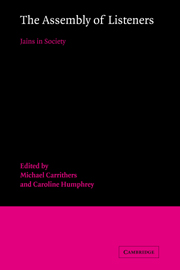Book contents
- Frontmatter
- Contents
- List of illustrations
- List of contributors
- Acknowledgements
- Map: South Asia
- Introduction
- 1 Jains as a community: a position paper
- 1 JAIN IDEALS AND JAIN IDENTITY
- 2 LOCAL JAIN COMMUNITIES
- 3 JAINS IN THE INDIAN WORLD
- 4 NEW JAIN INSTITUTIONS IN INDIA AND BEYOND
- 14 New Jain institutions in India and beyond
- 15 Reform movements among Jains in modern India
- 16 Orthodoxy and dissent: varieties of religious belief among immigrant Gujarati Jains in Britain
- 17 The foundations of community among southern Digambar Jains: An essay on rhetoric and experience
- Conclusion
- Glossary and pronunciation
- Select bibliography
- Index
15 - Reform movements among Jains in modern India
Published online by Cambridge University Press: 07 October 2011
- Frontmatter
- Contents
- List of illustrations
- List of contributors
- Acknowledgements
- Map: South Asia
- Introduction
- 1 Jains as a community: a position paper
- 1 JAIN IDEALS AND JAIN IDENTITY
- 2 LOCAL JAIN COMMUNITIES
- 3 JAINS IN THE INDIAN WORLD
- 4 NEW JAIN INSTITUTIONS IN INDIA AND BEYOND
- 14 New Jain institutions in India and beyond
- 15 Reform movements among Jains in modern India
- 16 Orthodoxy and dissent: varieties of religious belief among immigrant Gujarati Jains in Britain
- 17 The foundations of community among southern Digambar Jains: An essay on rhetoric and experience
- Conclusion
- Glossary and pronunciation
- Select bibliography
- Index
Summary
Unsurprisingly, in view of the close social affinities between the Jains and the Hindus, we find the development and prevalence of very similar social conditions and problems among both. Due to the deep impact of new forms of thought and culture, the spread of education, the application of new technology, and the acceptance of new social values in the late nineteenth and twentieth centuries there developed a strong awareness among the Jains, as among Hindus, of the necessity for reforming social and religious practices. Jains reacted to this awareness along the same lines as the Hindus, but on behalf of their own community and in the light of its special identity. As a result we find that several reform movements were initiated and carried out by and for Jains during the twentieth century in the fields of religious and social practices.
Socio-religious reforms
As regards religious practices we find that leaders of different sects among the Jains launched several reform movements pertaining to the social dimension of religious matters.
Among reform movements of the Digambar sect the Dasā Pūjādhikāra Ᾱndolana, that is, the Dasā's Right to Worship Movement, occupied a prominent position. Dasās are those belonging to the dasā division found in a number of Jain castes, such as Agaravāla, Osavāla, Hummada, and Porvada in Northern and Western India.
- Type
- Chapter
- Information
- The Assembly of ListenersJains in Society, pp. 233 - 240Publisher: Cambridge University PressPrint publication year: 1991
- 1
- Cited by



